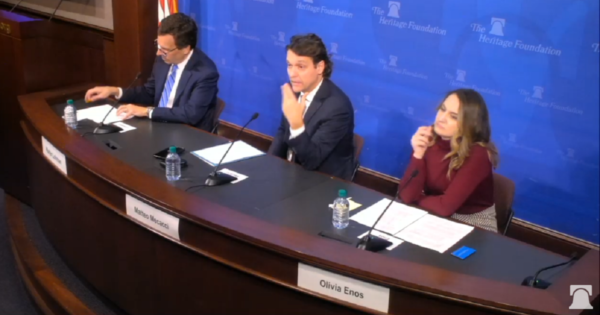
ICT President Matteo Mecacci said Tibet was a US national and strategic interest at an event at the Heritage Foundation on Nov. 21, 2019.
The US and other countries should see Tibet as a national and strategic interest, the International Campaign for Tibet’s (ICT’s) president said at a Heritage Foundation event Thursday where Tibet’s importance to the US was a major theme.
The event, “Preserving Freedom in Tibet,” featured a headline speech from Lobsang Sangay, president of the Central Tibetan Administration (CTA)—which provides democratic governance for the Tibetan diaspora—followed by a panel discussion with ICT President Matteo Mecacci and Olivia Enos and Walter Lohman of the Heritage Foundation, one of Washington, DC’s most influential think tanks.
“There is an opportunity for countries to look at China from their own point of view,” Mecacci said in his remarks, “not just from the point of view of the repression that is happening in Hong Kong, in Tibet, in Xinjiang [known to Uyghurs as East Turkestan], but actually to see that when you have such repression happening inside a country, apart from the moral clarity issue…there is interest from your side.”
In particular, Mecacci focused on the issue of reciprocity, which requires nation states to treat each other’s citizens in an equal way. This principle of international law is central to the Reciprocal Access to Tibet Act (RATA) that was passed by the US Congress and signed into law by President Trump last December.
RATA requires the State Department to assess the level of access to Tibet granted to US citizens by the Chinese government and, based on the restrictions that are actually imposed on American citizens, deny US visas to Chinese officials responsible for such policies. The first list of Chinese officials banned from coming to the US will be communicated by the State Department to the US Congress by the end of the year.
Mecacci underscored how ICT’s campaign to apply reciprocity in US-China relations beyond trade issues has made serious progress after the passage of RATA and with a recent measure adopted by the State Department on Chinese diplomats operating in the US.
Water security
One specific interest Mecacci mentioned that the US and other countries have in Tibet is water security.
Noting that Tibet has the largest repository of freshwater outside the North and South Poles, Mecacci said China has refused to cooperate with international conventions regulating transnational rivers and has been building dozens of dams along Tibet’s waterways, which provide water to more than 1 billion people across Asia.
“Making sure there is full access to the Tibetan Plateau and to its resources, not just for China but for the entire region, is a strategic issue that should be put on the table in the context of US-China relations,” Mecacci said.
He noted that water security is addressed in the Tibetan Policy and Support Act, a new bill introduced in Congress this fall that upgrades US support for Tibet and establishes an official US policy that only Tibetans, and not the Chinese government, can decide the eventual successor to the Dalai Lama.
Mecacci said the introduction of the bill, along with the passage of RATA and the success of bills supporting Hong Kong protestors and Uyghurs, reveal a shift in US policy.
“There is an opportunity, we think, to bring back the discussion around human rights and rule of law at the center of American foreign policy,” he said.
Growing US support
During his speech, Sangay—known to Tibetans as the “Sikyong”—also spoke about America’s increasing focus on Tibet, noting that funding for Tibetan communities in India and Nepal has increased dramatically in the past three years.
The Sikyong pointed to the importance of Vice President Pence’s landmark speech on China in October 2018—where he mentioned the more than 150 Tibetans who have tragically self-immolated under Chinese rule over the past decade—and Ambassador-at-Large for International Religious Freedom Sam Brownback’s visit to Dharamsala, India last month to meet with the Dalai Lama and CTA and express US support for Tibetans’ religious rights.
Sangay said China’s continued repression in Tibet, East Turkestan (Xinjiang) and Hong Kong, as well as its aggression toward its Asian neighbors, is raising alarms in the global community.
“All the neighboring countries are also waking up,” he said. “This is in a way a challenge and an opportunity to say we have to protect the freedom of the Tibetan people and freedom in China and freedom of the whole world.”
Enos, the Heritage Foundation analyst, similarly said Tibet is important as a proving ground for China’s increasing repression at home and around the globe.
“All of this was pioneered in the Tibet context,” she said. “So we must watch Tibet because it’s the cutting edge of where China starts its repression.”

